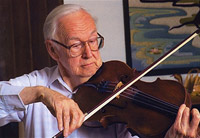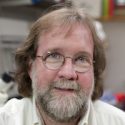UW geneticist James Crow passes away
The UW–Madison community is mourning the loss of a legend: James F. Crow, professor emeritus of genetics, who passed away peacefully at his home on Jan. 4, two weeks shy of his 96th birthday.

Crow, playing his viola. (Photo: Wolfgang Hoffman)
See also: a video of a talk given by Crow is available on the Wisconsin Public Television.
A memorial service for Crow is scheduled for Sunday, Jan. 15, at 3 p.m. at Capitol Lakes Retirement Community, 333 W. Main St.
Crow was a renowned researcher, teacher, mentor, colleague and administrator during a scientific career that stretched 70 years. An editorial published last month in the journal Genetics, introducing a series of articles in Crow’s honor, described him thus: “A gentleman and scholar of the highest order, he represents the best of our field.”
Crow was admired and highly honored for his groundbreaking research in the field of population genetics. His work touched nearly every aspect of the field and included mathematical and statistical genetics, inbreeding, genetic effects of radiation, natural variations in populations, sex determination, plant and animal breeding, selfish genes, transposable elements, the impact of mutations on populations, and the genetics of pesticide resistance. In 1970 he co-authored with Motoo Kimura a landmark textbook, “An Introduction to Population Genetics Theory,” which laid much of the groundwork for the mathematical basis of population genetics theory and is still considered a classic.
“He was an inspiring and stimulating person,” says Rayla Temin, a UW–Madison adjunct professor emeritus of genetics who completed her Ph.D. with Crow in 1963. She and her late husband, Howard Temin, were longtime friends and collaborators of Crow’s. “When you were in his presence, he made you happy just to be in the aura he cast.”
Born in Phoenixville, Pa., in 1916, Crow earned a B.A. from Friends University in Wichita, Kan., where his father taught, and a doctorate in zoology from the University of Texas, Austin. He began his career at Dartmouth College in 1941 and joined the UW–Madison genetics faculty in 1948. Although he retired in 1986, Crow remained an active member of the campus genetics and evolution communities until his death, and he was still a popular speaker and a regular sight at campus seminars, where he continued to contribute insightful comments and questions.
“Jim aged, but he never stopped learning or thinking,” says Millard Susman, professor emeritus of genetics, who knew him for 50 years. Just two weeks ago, Crow was in his campus office working on a new paper.
Crow was a man of service. During his decades at UW–Madison, he served stints as chair of the Departments of Genetics and Medical Genetics and as acting dean of the School of Medicine and Public Health. He served as president of several professional organizations and on more than a dozen national advisory and review committees, often as chair. He was also active in numerous local and civic activities.
Crow’s extraordinary scientific productivity was recognized through membership in the National Academy of Sciences, National Institute of Medicine, the Japan Academy, the Royal Society, and numerous other national and international professional societies. He wrote hundreds of scholarly articles and books and continued to publish throughout his career and retirement. He received multiple lifetime achievement awards, including the Genetics Society of America‘s Thomas Hunt Morgan Award in 1978, which he followed with another three decades’ worth of contributions.
“He was smarter than anybody else, and yet, he never showed any impatience with anyone else,” says Susman. “Some brilliant people are just insufferable to be around, but that wasn’t Jim.”
During the course of his career, Crow witnessed the discovery of the structure of DNA, an increasing role of technology and computers, the advent of cloning and the sequencing of the complete human genome. He embraced the advances and stayed current with several fields. Says Temin, “Jim was a brilliant synthesizer of knowledge,” always curious about new things and eager to pursue unexpected leads.
In the classroom, Crow was known for the clarity and effectiveness of his explanations. An elegant and seemingly effortless writer, he published the lecture notes for his trademark undergraduate genetics course as a book titled “Genetics Notes” — most people called it “Crow’s Notes” — that went through eight editions and was translated into multiple languages, reaching countless students even beyond the UW–Madison campus. It was so popular with students that Barry Ganetzky, a UW–Madison genetics professor and longtime colleague of Crow’s who now teaches the course, finally dropped “Crow’s Notes” as a recommended text after finding that students read it to the exclusion of the other required material.
Crow was also a dedicated adviser and mentor, and his list of former graduate students and postdoctoral fellows reads like a who’s-who of the field. Though perpetually busy, he was generous with his time. “His door was always open, and he was never too busy to talk to you,” Ganetzky says. “Just being within his gravitational pull, he was a tremendous influence.”
A brilliant mind and a fabulous storyteller, Crow was a font of historical scientific anecdotes — often because he had personally known so many of the major players in the field of genetics. He published many of these histories in “Perspectives,” a column he pioneered in the journal Genetics. His broad understanding and ability to distill even the most complex concepts made him a highly sought speaker and lecturer in Madison and around the world.
He was also an accomplished musician and very active in the local music community. He played viola in the Madison Symphony Orchestra from 1949-1994 and served as president of the orchestra and of the Madison Civic Music Association. When he turned 90, he began giving annual birthday recitals for the genetics department, and in recent years, he performed frequently for his retirement community. For his many services to the Madison music community, Crow was honored in 2008 with a gala dinner at the Madison Opera performance of “Madama Butterfly.”
As accomplished as he was, Crow was gracious and self-effacing. “He was a true gentleman in every sense of the word,” says Ganetzky. “I never heard him raise his voice or criticize anybody. He had the most positive outlook on life.”
“When you were with him, he made you feel like you were the most important person at that moment,” Temin says.
Charming and social, Crow loved parties and celebrations and befriended professors and students alike. He was also known for his stabilizing influence and was often tapped for his ability to lead diverse groups toward cooperation.
“He always gave credit where credit was due,” often helping to further others’ careers, says Susman. “He was very generous and very modest.”
He is memorialized on campus through the James F. Crow Institute for the Study of Evolution, a cross-campus institute formed in 2009 to unite evolution researchers from multiple departments, schools and colleges.
In a 2000 interview for a genetics history project, former student Daniel Hartl, now a professor at Harvard University, asked Crow what he thought his legacy would be. “If I have a legacy,” Crow answered, “part of it is the collaborative work that I’ve done with other people. But I want to say that part of my legacy is students. I’ve had an unusually good group of graduate students and postdocs, many of which have gone on to make names for themselves in genetics, and I like to think of that as my real legacy.”
A memorial service for Crow is scheduled for Sunday, Jan. 15, at 3 p.m. at Capitol Retirement Community, 333 W. Main St., Madison.
Tags: genetics, obituaries, research



